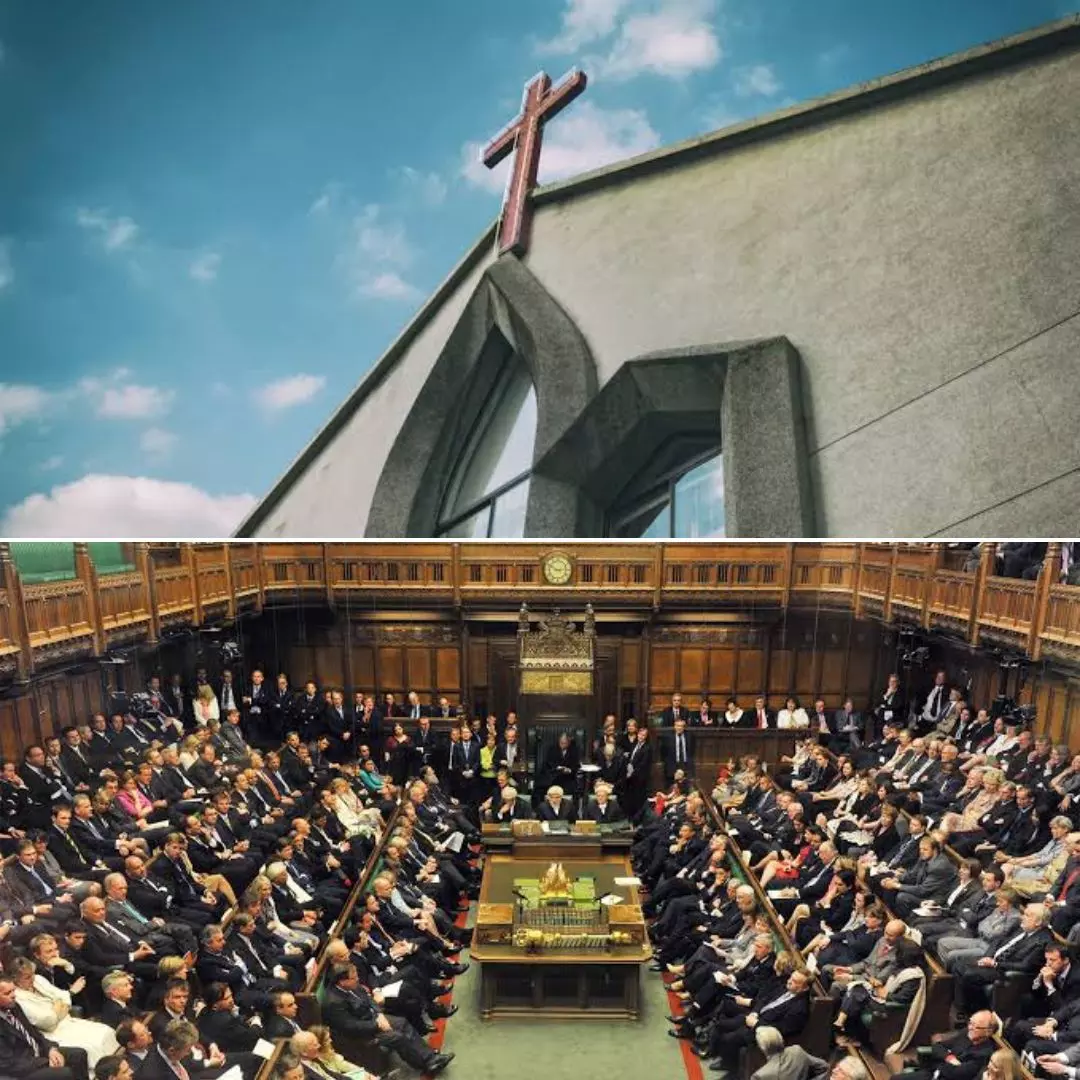
Image Credits: Britannica and Unsplash
Christians Now A Minority In UK & Wales: Has Irreligion Become The Norm For Countries To Prosper?
Others/World, 4 Dec 2022 5:24 AM GMT | Updated 4 Dec 2022 5:26 AM GMT
Editor : Jayali Wavhal |
She writes about gender issues, human interest, and environment.
Creatives : Laxmi Mohan Kumar
She is an aspiring journalist in the process of learning and unlearning many things. Always up for discussions on everything from popular culture to politics.
With a recent survey indicating that majority of Britain no longer associates with any form of religious belief, The Logical Indian explores the correlation between the development of a nation and an irreligious population.
At present, there are numerous theories on the evolution of religion, and one of the most repeated ones comes from the era when humans evolved from small hunter-gatherer tribes into large agrarian cultures. The theory states that the tribes built the idea of an all-seeing 'God', to encourage moral behaviour, cooperation, and tolerance among relative strangers.
In the contemporary age, there are an estimated 10,000 distinct religions worldwide. A system initially brought in to mould civilisation and unity has now segregated people into groups and has also proved dangerous for many communities. For years, researchers looked into the impact religion has on the developmental structure of a country and deduced that it considerably hinders progress.
With more people from developed countries starting to identify as "irreligious," this discussion has been brought back to the table. The Logical Indian, in conversation with Kanishka Sinha, managing partner of Stillwater, attempts to explore this correlation between (ir)religion and development.
Three Threats Religion Could Pose To A Nation
On November 30, major media outlets reported about a census released by the Office for National Statistics in the United Kingdom (UK). In a first, the statistics revealed that less than half of the population of England and Wales considered themselves Christians. With a surge in the population identifying as having "no religion," a significant demographic shift was observed toward a relatively secular and diverse Britain.
The census also painted a new portrait of a much less Christian population within a government traditionally entwined with the Church of England. Some 46.2 per cent of England and Wales population described themselves as Christian in the 2021 census, compared to the 59.3 per cent recorded a decade back. 'No religion' was recorded as the second most common response that saw an increase from 25.2 per cent to 37.2 per cent. More than one in three people now do not associate themselves with any religion. Additionally, the diversity within the community also expanded with a rise in other religious and ethnic communities.
Now, the country has over 22 million people who do not associate with any religion, according to an article by the Indian Express. There is also a noticeable decline in the number of churches. Many church buildings in major cities have been reportedly converted to community and arts centres, concert halls or even condos. Does this distancing from religion indicate the progress of a population, or has it become a prerequisite for countries to do away with religion in order to attain the "developed nation" tag?
Speaking about this, Kanishka enumerated three problems that come along with religion. The first one being the idea of superstition versus science. Superstition inevitably comes along with belief, and it weighs in more than scientific understanding for believers. To substantiate this concept, he cites the example of people turning to prayers over medicines and ringing bells to ward off a pandemic. So when faith overrides rationality and evidence, it has a high probability of getting in the way of progress.
Secondly, religion acts as a divisive factor. With multiple religions come along multiple complexities, where people tend to place their religious morale higher than the rest. This competitive nature could reflect in every aspect of their life, from the food they consume to their way of living. It also comes with a lot of judgement and alienation, which would manifest into conflict within the community.
Thirdly, he says that people who act as representatives of a particular religion can have authoritarian tendencies. These tendencies, along with the religious manifold, might have these representatives roll out policies that would benefit their religious community and possibly squash the interests of others. Progress would then be rather tunnelled in this format, and anybody who questions it stands at risk of being labelled as a blasphemer or anti-national.
According to Kanishka, these are some major obstacles that religion could pose against the progress of a country.
Irreligion Does Not Equalise To Progress
Religion has the capacity to pose challenges against progress, but it is not the only criterion that holds back a nation. Explaining this idea, Kanishka tells The Logical Indian, "Not having religion by itself does not mean you have progress. This can be seen from examples of places like Russia and China. Though they are not necessarily religious, their idea of nationalism can force people into fighting wars against other people. The people there can not speak against the authority, there's no free press, and so on."
Even if one looks at the history of several communist states from the 1940s, this theory would be validated. Communism does away with religion, but many such states did not develop economically and did not perform as well as Western Europe, which had a considerable religious population. So, while removing religion gets rid of some barriers, it is not the only prerequisite that could lead a country to progress and development.
Religion, The Opium For Uncertainty
Religion was infamously tagged as the "opium of the people" by German sociologist and economic theorist Karl Marx. In his famous argument, Marx expounded that people constructed religion as a response to uncertainty. In his own words, "Religion is the sigh of the oppressed creature, the heart of a heartless world, and the soul of soulless conditions. It is the opium of the people," as quoted from Wikipedia.
Simplifying this idea of religion acting as a safety net during uncertainty, Kanishka put forward the example of a village with no policemen, guards, CCTV, or any form of security. To keep people under moral watch, the social construct of an all-seeing God, who would punish one for their crimes, came about. So even in the absence of safety and certainty, religion established a sense of right or wrong.
Religion acted as the founding belief for a peaceful and structured civilisation to survive back then. It allowed them to behave harmoniously, but it got complicated when people began believing in more than one kind of God. This brought a need to establish new ways to bring people together for a harmonious living. In India, alongside religion, rights were guaranteed to people through the constitution and legal structure.
For over eight decades, anthropologists and sociologists have pondered the question of why economically developed countries gradually turn toward a form of atheism or irreligion. James Frazer, the Scottish social anthropologist, proposed that the capacity for "scientific prediction and control of nature" replaces religion, as there no longer exists a form of uncertainty within the population. This theory of his was supported by data that reflected that scientific and developed communities tend to have higher levels of non-belief.
In developed nations, precise social welfare programs and safety nets exist for the people in the form of education, healthcare, law and other guarantees. With this, a good portion of uncertainty is waded off, and it would demand a lesser need for reassurance handed down by religious entities. Such theories indicate that many distance themselves from religion as development comes into the equation. This could be one possible explanation for why less than half of the people identify with Christianity in the UK and Wales today.
Prosperity As A Lottery For Some Countries
Studies have often conveyed that countries with a highly religious population often fall on the last rows of development indexes. Digging deeper into this conversation, The Logical Indian posed a question as to how then an extremely religious country such as the United Arab Emirates made its way to becoming a developed nation?
Responding to this, Kanishka said that "as a general rule, the less religion you have, the higher are the chances of a country getting more prosperous and developed. This is not devoid of exceptions." Regions like Saudi Arabia, Qatar, Dubai, and so on are religious but are also very rich in resources such as oil. For about 250,000 people, they would have trillions of gallons of oil that they could sell. With the entire world economy running on oil, these countries struck the lottery with their resources.
So unlike the other countries, where a balance had to be struck between religion and rationale, most of the middle east did not have to deal with this concern as they had the direct ticket to prosperity with oil buried beneath their home ground. But once this source of wealth dried off, there remains an undeniable threat of inequality and poverty that could again fracture society. This is seen in the cases of religious countries like Afghanistan, which is not very oil-rich, and continues to be torn apart by wars and crimes against humanity.
Striking a balance is often key, and while religion is not the sole deciding factor toward prosperity, it sure has some level of impact. Looking within India's democratic structure, many politicians continue to hold power despite their criminal records and lack of rational decision-making capacity. They are elected to power solely because they advertise themselves as belonging to a certain community, and the community identity is strong within India. So despite their inefficiency and corrupt nature, people vote for them with the notion, "They belong to my community, so they must be good."
According to Kanishka, "Any place where there's a greater level of group identity or religious affiliation of caste and so on, you're going to get more corruption because people are not voting based on honesty or capability that bolsters a community." Once religion and community identity steer clear out of politics, people would begin voting based on competence and a desire to see the progress of the country rather than a single community. This way, irreligion benefits and catalyses a democratic functioning to progress towards development.
Also Read: No, India Does Not Have Religion-Induced Population Imbalance As RSS Chief Mohan Bhagwat Claims
 All section
All section














